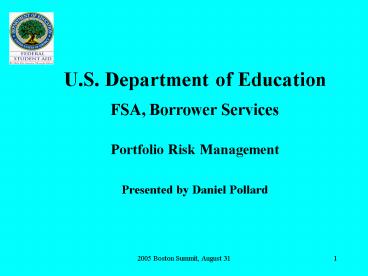U.S. Department of Education FSA, Borrower Services - PowerPoint PPT Presentation
1 / 17
Title:
U.S. Department of Education FSA, Borrower Services
Description:
Work with schools, lenders, and guaranty agencies to insure that the Title IV ... to include risk factors of the borrower, large $ balances, # of days delinquent ... – PowerPoint PPT presentation
Number of Views:39
Avg rating:3.0/5.0
Title: U.S. Department of Education FSA, Borrower Services
1
U.S. Department of EducationFSA, Borrower
Services
- Portfolio Risk Management
- Presented by Daniel Pollard
2
Student Loan Basics
- Approximately 400 billion in outstanding federal
student loans. - Nearly 30 million borrowers.
- More than 50 of the outstanding FFEL/DL balance
is in consolidation. - Average outstanding loan balance in
consolidation is approximately 18,450.
Source National Student Loan Data System
(NSLDS), CSB Data Mart,, July 31, 2005
3
What is Portfolio Risk Management?
- Portfolio risk management mitigates risk for
performing and non-performing loans. - Shifts from transaction management to portfolio
management. - Changes from monitoring performance to predicting
portfolio performance. - Focuses vision and concentrates efforts on
default prevention and reducing the cost to the
taxpayer.
4
Advantages of Portfolio Risk Management
- Understand the elements of the portfolio.
- Manage through the life of the loan.
- Identify borrower attributes that impact
performing and non-performing loans. - Prevent a scatter gun and managing on demand
approach.
5
A Focused Vision
- Created a Portfolio Risk Management Group to
focus on the risks associated with the Title IV
Programs - Responsible for supporting the performance
evaluation of federally guaranteed loan programs. - Identify and analyze risk exposure for Title IV
programs. - Work with schools, lenders, and guaranty agencies
to insure that the Title IV programs continue to
reduce risk of default.
6
A Focused Vision (cont.)
- Transform data into information
- Analyze borrower behavior
- Identify significant patterns and trends of a
delinquent borrower - Identify risk parameters
- Recommend tools that may reduce delinquency and
avoid default - Repayment options tailored to the borrower
- Expand eServices for loan programs which provide
increased service opportunities to the borrower - Increased focus on due diligence to include risk
factors of the borrower, large balances, of
days delinquent
7
Ways to Approach Portfolio
- New Commitments
- Monthly, Quarterly, Annual
- Transaction-focused
- Outstanding Balance
- Trends
- Dollars or Loans/Borrowers?
- What are your goals?
- Consolidated vs. Non-Consolidated
8
Composition of the Outstanding Loan Portfolio
Source NSLDS and Common Services for Borrowers
(CSB) Data Mart 7-31-05
9
Composition of the Outstanding Loan Portfolio
Source NSLDS 7-31-05
10
Composition of the Outstanding Loan Portfolio
Source CSB Data Mart 7-31-05
11
How Do You Manage Risk?
- Know the borrower through the life of the loan.
- Identify borrower attributes throughout the life
cycle of the loan that impact performance of the
loan. - Look for patterns, trends or changes in behavior.
- Identify significant patterns and trends of a
delinquent borrower. - Develop a targeted approach to understanding the
borrower.
12
How Do You Manage Risk? (cont.)
- Use data mining to find patterns and subtle
relationships in data and rules that allow the
prediction of future results. - Build tools to focus on the risk factors and
proactively attack the risks. - Communicate consistently and effectively with the
borrower. - Assist in improving financial literacy.
- Develop strategies tailored to your portfolio
mix, borrower behavior, past performance, and
current environment.
13
Whats on the Horizon?
- Impact of Private Loans
- Bankruptcy Law -- Oct. 05
- Growth of Distance Learning
- Flat Economy
14
Private Loans
15
Private Loans (cont.)
16
Summary
- Portfolio Risk Management is a commitment by
FSA/Department of Education to focus on reducing
risk of a portfolio of 400 billion. - Increased focus on default prevention rather than
the previous focus of default collector. - Coordination of efforts within FSA as well as
partnerships with schools and the FFEL community
are critical to the success of reducing risk. - Understand the performance of your portfolio.
- As a taxpayer, you are a share/stakeholder in the
federally insured student loan portfolio each of
you has a vested interest in insuring that your
investment is managed well.
17
Questions?































